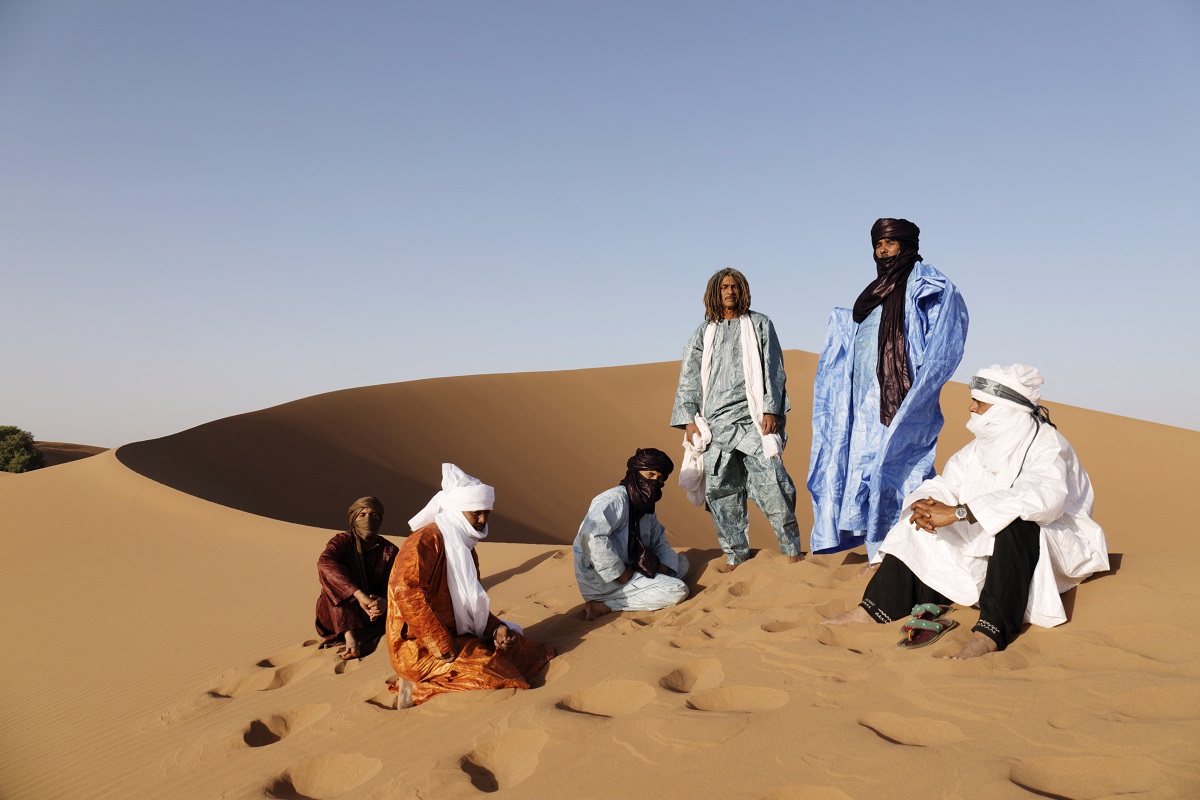The members of Tinariwen are Tuareg people, a semi-nomadic Muslim population native to the Sahara Desert. Specifically, they come from a Saharan mountain range in north-eastern Mali, close to the Algerian border. Throughout their career – which extends back to the late 1970s – intermittent conflicts in Mali have forced the band members to relocate into neighbouring Algeria, or else spend extended periods of time in the USA or Morocco.
Political lyrics, relating to the members’ own personal struggles and the broader concerns of Tuareg people, have long been a central component of Tinariwen. This is again the case on the band’s latest album, 2017’s Elwan.
Without claiming any sort of heroic significance, the band members believe their regular incorporation of politically pertinent concerns has been effective in giving hope to listeners in similar situations and rallying support from likeminded individuals.
“We have support from a lot of different people from different minorities,” says the band, via email. “Each time we play in a place where nomadic people live, they come see us and share their issues with us, so I think our message touches some people.”
Recent events in Western countries have led to an outgrowth of politically-minded songwriting. Some listeners would prefer music and politics remained separate, but there’s a convincing argument that writing about your life circumstances is inevitably a political act, whatever level of indifference you may purport to feel. This certainly holds for Tinariwen.
“In our songs we don’t talk about politics,” the band says. “We talk about the situation of our people in our land, which in a way is political because our issues are depending on the administration’s decisions in terms of infrastructure – schools, hospitals – but also in terms of climate change, drought…”
The band members’ investment in matters affecting their homeland has not led to creative insularity, however. Tinariwen’s three most recent albums feature a variety of guest American musicians. 2014’s Emmaar and 2011’s Tassili included contributions from the likes of TV on the Radio, Saul Williams, Wilco’s Nels Cline and Red Hot Chili Peppers’ Josh Klinghoffer.
Elwan, meanwhile, welcomes in Kurt Vile, Alain Johannes, Mark Lanegan, and a returning Matt Sweeney (who also played on Emmaar,and is known for his appearances with Iggy Pop and Bonnie ‘Prince’ Billy).
“Matt Sweeney is a long time friend. Kurt is a big fan of ours and asked to record with us. Mark Lanegan was recommended to us by Alain Johannes.”
It’s fair to say musicians like Kurt Vile and Mark Lanegan wouldn’t enjoy quite the public profile in Mali that they do in their home country. But someone’s popularity in Northern Africa is hardly a consideration when Tinariwen enlists guest contributors.
“We like working with musicians who like our music. This is also a way to reach an audience who can be different from the regular ‘world music’ audience.”
Vile appears on two of Elwan’s songs – opener ‘Tiwayyen’ and the soulful late-album highlight ‘Nannyflay’ (that also features Lanegan). Vile is a very distinctive guitar player who has developed a signature sound across his six solo releases. But on ‘Tiwayyen’ in particular he blends in seamlessly with the rest of the band.
“He was just listening to the songs laying down on the floor and played what he had in mind.”
Along with the guest contributors, the Tinariwen lineup consists of musicians from multiple generations. Guitarist and vocalist Ibrahim Ag Alhabib formed the band in 1979 and remains at the core of its activities. However, there are now a number of younger musicians involved who help preserve the band’s vitality.
“Young members of the band are bringing new styles and ideas, and this is why Tinariwen is different from other Tuareg bands. There are four main composers: Ibrahim, Abdallah [Ag Lamida, guitar], Hassan [Ag Touhami, guitar/vocals] and Eyadou [Ag Leche, bass guitar] and each of them have their own style.”

